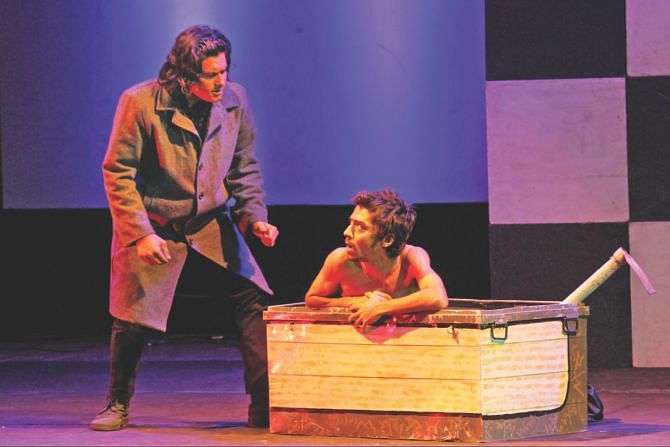Shakespeare is Ours

On the third and closing day of the Hay Festival Dhaka 2014, a session celebrating the 450 years of Shakespeare, shed light on the universality of Shakespeare's works. How Elizabethan Shakespeare is transposed into a modern Bangladesh and how his plays became a part of Bangladesh's own theatre transcending the boundary of time and place, were central points in the session.
“Shakespeare is Ours: Celebrating 450 Years of Shakespeare” began at the main stage with the performance of selected parts from three plays of Shakespeare. Dhaka Theatre performed parts from “The Tempest”, Theatre and Performance Studies Department of Dhaka University performed “Hamlet” and Padatik Natya Sangsad, TSC staged “Macbeth”.
Following the performances, a panel discussion began with noted thespians Aly Zaker and Sara Zaker as panelists. Dr. Samina Lutfa, a playwright, theatre actor and a teacher at the Sociology Department of Dhaka University, moderated the session.
Aly Zaker began with the history of Shakespeare in Bangladesh. He walked down the memory lane to recall the days in his twenties, when he, as a young theatre activist translated Shakespeare in Bangla. Sara was a performer in the play called “Darpan” an adaptation of “Macbeth” in the dialect of the greater Mymensingh region.
Aly Zaker then moved on to explain the reason behind translating Shakespeare. He said, “I thought audience should be introduced to world theatre, and picked up Shakespeare since his plays assimilate world theatre. When 'Darpan' was staged, local audiences accepted it enthusiastically and we discovered the uncanny similarities between Shakespeare's words and ours,” he added.
Sara Zaker, who played a witch in “Darpan”, observed that the subtext is important while translating a work. Shakespeare's messages are universal and audience can easily relate to it.
The insightful session concluded with an emphasis on the socio-political relevance of Shakespearean plays in the present context of Bangladesh. The panelists came to a point that Shakespeare is close to our ethos.

 For all latest news, follow The Daily Star's Google News channel.
For all latest news, follow The Daily Star's Google News channel. 



Comments